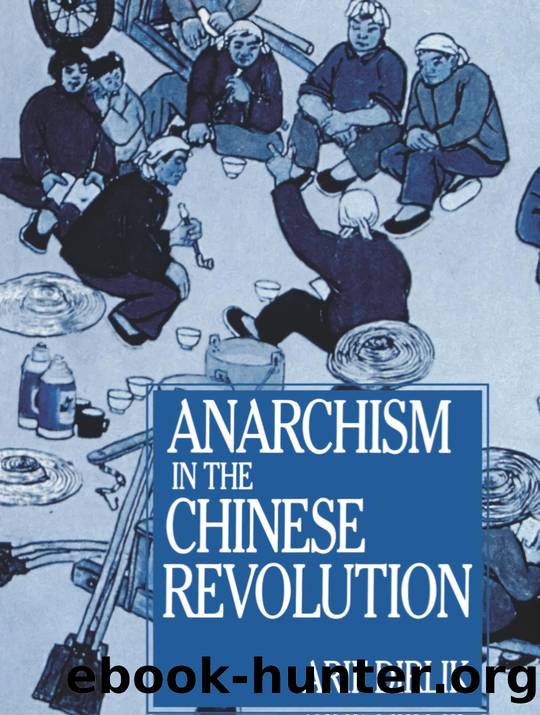Anarchism in the Chinese Revolution by Arif Dirlik & Arif Dirlik

Author:Arif Dirlik & Arif Dirlik
Language: eng
Format: epub
Tags: China, History, Chinese Revolution, Mao, Chinese Anarchism, Shifu, Bolshevism, anti-Bolshevism
Published: 1991-10-14T16:00:00+00:00
Participants in the New Culture Movement viewed it as a Chinese Renaissance. In later years, the movementâin its emphases on science and democracyâwould be compared to the European Enlightenment, which still holds an important place in representations of the movement. Liberal historians have stressed the movementâs liberalism; Communist historians on the whole have agreed with this assessment, adding as a social dimension the bursting forth of a bourgeois revolution in China.[285] I think we cannot identify the New Culture Movement with any one ideology, if by ideology we understand an articulate conception of the world with an exclusive structure of social and political action. The New Culture Movement was not informed by an ideology that, having captured the consciousness of a generation, stood guard, as it were, at the gates of that consciousness to determine the flow of ideas. The New Culture Movement was a movement of ideas, a consciousness in the making with a history of its own. Anarchism was one of these ideas. Anarchist ideas were readily available to anyone who sought them; during these years more people sought them than ever before or after in Chinese thought. Anarchists proliferated, and anarchism spread in Chinese thought as the movement gained momentum.
The efflorescence of anarchism during the May Fourth period is not inconsistent with the representation of the May Fourth Movement (in its New Culture phase) as an Enlightenment. Anarchism in Europe had deep roots, April Carter has argued, in the political philosophy and outlook of the eighteenth-century Enlightenment; it is possible to view an anarchism such as Kropotkinâsâ as an uncompromising reaffirmation of the Enlightenment promise when others, including liberals, had already given up on the possibility of its realization.[286] Any such analogy, however, is of necessity imperfect and may conceal more than it reveals. The popularity of anarchism was bound up primarily with concrete problems that emerged as the Chinese revolution unfolded following the republican Revolution of 1911, problems to which anarchism seemed to offer solutions consistent with the prevailing mood of Chinese radicals. One Chinese historian has written:
Under the conditions of several thousands of years of feudal despotism, especially with the decline of government with constant warlord disaster and repeated by ineffective efforts at governmental reform, it was easy for the people at large to become disgusted with politics. On the other hand, the Chinese intelligentsia was mostly of petit-bourgeois origin; it had a personality that was subjective, superficial, evanescent, and impatient. When they began to demand revolution, what best suited their taste was not scientific socialism but empty and high-blown utopias, and anarchism which flaunted existing customs.[287]
Download
This site does not store any files on its server. We only index and link to content provided by other sites. Please contact the content providers to delete copyright contents if any and email us, we'll remove relevant links or contents immediately.
| Anthropology | Archaeology |
| Philosophy | Politics & Government |
| Social Sciences | Sociology |
| Women's Studies |
The Secret History by Donna Tartt(16619)
The Social Justice Warrior Handbook by Lisa De Pasquale(11489)
Thirteen Reasons Why by Jay Asher(7786)
This Is How You Lose Her by Junot Diaz(5768)
Weapons of Math Destruction by Cathy O'Neil(5034)
Zero to One by Peter Thiel(4823)
The Myth of the Strong Leader by Archie Brown(4789)
Promise Me, Dad by Joe Biden(4444)
Stone's Rules by Roger Stone(4415)
Beartown by Fredrik Backman(4414)
How Democracies Die by Steven Levitsky & Daniel Ziblatt(4398)
The Fire Next Time by James Baldwin(4341)
100 Deadly Skills by Clint Emerson(4076)
A Higher Loyalty: Truth, Lies, and Leadership by James Comey(4031)
Rise and Kill First by Ronen Bergman(4012)
The David Icke Guide to the Global Conspiracy (and how to end it) by David Icke(3881)
The Farm by Tom Rob Smith(3871)
Secrecy World by Jake Bernstein(3782)
The Doomsday Machine by Daniel Ellsberg(3730)
